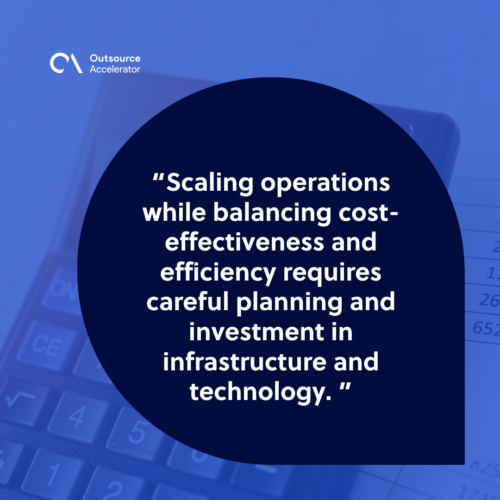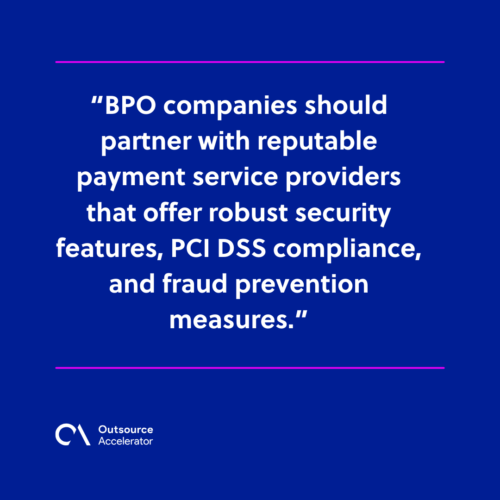Unlocking success: Vault Outsourcing’s journey with Payoneer’s seamless payment solutions

Over the years, offshoring companies have significantly evolved, transforming the global business landscape. This strategic move has allowed businesses to tap into diverse talent pools, reduce costs, and expand their market reach.
While offshoring offers numerous benefits, such as increased efficiency and flexibility, it also presents challenges, particularly in effectively executing global transactions.
For one, paying remote employees has been a persistent hurdle, as companies must navigate through various methods to ensure timely payments.
This article will define challenges in the outsourcing industry and showcase Vault Outsourcing’s firsthand success story – demonstrating how they have effectively utilized Payoneer‘s fast and secure payment solutions.
4 issues that BPO companies face today
As integral components of the global business ecosystem, BPO companies have become crucial in providing various services to organizations worldwide.
However, amid the ever-evolving tech advancements, client expectations, and globalization, they encounter these main challenges that impact their operations and success:
Talent retention and training
The attrition rate for the BPO sector continues to be on the rise. According to McKinsey & Company, call centers experience an average annual turnover rate of up to 60% each year. However, Vault Outsourcing, a Philippines-based outsourcing firm, has an impressive annual turnover rate of only 10%.
How do they continuously achieve this? It’s simple.
Vault Outsourcing recognizes the negative effects that employee turnover can have on its partners. That is why the company takes great care in finding the right people from the beginning.
In addition to offering above-market salaries and the best insurance, they offer free employee sporting activities, game days, education, and mental health programs to their employees. They also take pride in providing the most advanced tools and training available.
Flexibility and scalability
BPO firms must adapt quickly to fluctuating workload volumes, seasonal variations, and changing client requirements.
On top of that, they must also:
- Ensure the availability of skilled personnel
- Adjust resources accordingly
- Maintain service quality during periods of rapid expansion or contraction
Scaling operations while balancing cost-effectiveness and efficiency requires careful planning and investment in infrastructure and technology.

For instance, Vault Outsourcing has nearly a decade of experience in offering offshore teams that cater to the unique needs of their partners. They understand that identifying clients’ specific requirements is crucial for the success of their offshore team.
This BPO firm ensures that its partners are provided with the right employees, enabling them to grow and progress successfully. Additionally, they stay updated with the latest market changes and new processes to maintain their market-leading practices regarding managing flexibility and scalability with offshore teams.
Infrastructure and technology upgrades
Keeping up with technological advancements while ensuring seamless integration with existing systems can be complex and costly.
Upgrading infrastructure to accommodate evolving client needs and industry standards requires substantial investment in both time and resources.
It’s always crucial to manage these innovations without disrupting ongoing operations, as they help maintain competitiveness and meet client expectations.
Global payments
Global payments also present considerable hurdles for BPO firms, given factors like:
- Currency exchange rates
- International fees
- Varying banking regulations across nations
Coordinating payments to dispersed personnel and partners entails careful monitoring and possible additional costs. Currency fluctuations can further complicate financial projections and bottom-line outcomes.
Navigating the intricacies of global payments poses unique challenges for BPO firms. In the upcoming section, we’ll delve into these challenges in more detail.
6 common challenges in making global transactions
While the remote work setup offers several advantages, there are a few potential hurdles that you’ll need to address, specifically when it comes time to pay your outsourced employees.
The realm of global transactions is a vast environment of differing practices and laws. Consider these challenges when handling international payments:
1. Global payment charges
Global transactions often incur additional charges. These can include:
- Currency conversion fees
- International wire transfer fees
- Intermediary bank fees
- Receiving bank fees
The charges themselves can also vary depending on the payment method, the countries involved, and the financial institutions used.
Accumulating these global payment charges can significantly increase the overall cost of conducting international transactions. This reduces the recipient’s funds and affects the sender’s budget.
2. Security issues
Security concerns pose a critical challenge when conducting global payments. The nature of cross-border transactions exposes those involved to risks such as:
- Payment fraud
- Unauthorized access
- Phishing scams
- Data breaches
- Cybersecurity threats
- Identity theft
Hackers may exploit vulnerabilities in the transaction process, resulting in financial losses and reputational damage.
Moreover, there is added complexity with the need to comply with different regulatory frameworks and security standards.
3. Compliance and legalities
Additionally, you must consider legal and compliance requirements, such as social security contributions and other benefits. These can get complicated when paying offshore workers.
4. Local payroll customs
Cultural norms and language barriers may affect how remote employees perceive and understand compensation-related matters. Each region and country brings its own customs.
For example, countries like the Philippines, Brazil, and Argentina offer a 13th-month bonus at the end of the year. Or how in France, overtime pay is 25% higher than the regular rate.

5. Currency exchange and conversion
If you have remote employees, you’ll need to navigate exchange rates and currency conversions to ensure accurate and timely payments.
Fluctuations in exchange rates can impact the actual compensation received, which may lead to additional costs on your end.
6. Multiple payment methods
Carefully consider how you disburse payments when conducting global payments and offshore transactions. Employers have multiple options, such as:
- Bank transfers
- Digital wallets
- Payment platforms
Selecting a suitable method can be challenging as not all options are available in every country.
Addressing these challenges requires adopting proactive measures to mitigate risks and optimize your efficiency. You’ll need a trusted payment platform from a company that utilizes financial best practices to ensure a smooth international payment experience.
5 tips and best practices for smooth BPO operations
Here are a few tips that you can consider to help resolve the more common issues that you face as an outsourcing services provider:
1. Promote a continuous learning culture
Create an atmosphere where workers are inspired to keep learning and developing. Implement regular training programs, both formal and informal, to upskill employees and keep them engaged.
These programs can include workshops, seminars, online courses, and certifications, among others.
2. Enable remote work options
Embrace remote work options where feasible. This not only provides flexibility for employees but also expands the talent pool by allowing you to hire from a wider geographical area.
3. Embrace digital transformation
Digital transformation involves leveraging technology to optimize business processes, improve efficiency, and enhance the customer experience.
BPO firms should prioritize initiatives like the following to stay ahead in the digital age:
- Process automation
- Data analytics
- Artificial intelligence
- Cloud migration
4. Offer an all-in-one payment option
Outsourcing companies should offer all-in-one payment options to streamline processes, save time, and enhance security.
By consolidating payment methods into a single platform, transactions become simpler, more cost-effective, and easier to manage for both parties.
This approach not only boosts efficiency but also demonstrates a commitment to customer satisfaction, ultimately giving firms a competitive edge in the market.
5. Use secure payment platforms
Using secure payment platforms ensures the integrity and confidentiality of financial transactions.
BPO companies should partner with reputable payment service providers that offer robust security features, PCI DSS compliance, and fraud prevention measures. This will help safeguard client and customer data.
Vault Outsourcing, a BPO firm committed to building tailored offshore teams, knows the value of providing secure payment options. The company had previously partnered with a leading Forex solutions provider, but rising rates forced the business to adapt to a new strategy.

Dean Hutton, founder and CEO of Vault Outsourcing, believes in partnering with platforms that have actual expertise on the matter.
“Surround yourself with people with different skill sets to yourself. We often need to be experts in all fields, and that can become your biggest weakness.”
This led to them forging an alliance with the global payment platform Payoneer.
How Vault Outsourcing thrives with Payoneer’s simplified payment solutions
Early last year, Payoneer initiated efforts to forge stronger partnerships with the BPO sector.
As a financial technology company empowering the world’s SMBs to transact, do business and grow globally premier cross-border payment platform, Payoneer chose to work specifically with the Philippines’ local Business Process Outsourcing (BPO) industry.
This strategic collaboration aims to bolster the growth of the BPO sector by providing enhanced payment solutions and fostering greater accessibility to global opportunities.
Let’s delve into Vault Outsourcing’s journey as it makes a mark in the offshoring sector in partnership with Payoneer.
About Vault Outsourcing
Vault Outsourcing, a budding BPO based in Makati, was established in 2015 by Dean Hutton, drawing upon his prior experience in Fintech and Banking. By 2022, the firm received its ISO 9001 (Quality Management Systems) and ISO 27001 (Information and Data Security) certifications, proving its commitment to providing services that meet world-class standards.
Vault Outsourcing was initially born out of Dean’s quest within the Financial Services sector to:
- Optimize costs
- Enhance revenue
- Streamline operations
However, dissatisfied with existing outsourcing options that offered a standardized approach rather than tailored solutions, Dean recognized the need for a more personalized service.
Dean believes that “a one-size-fits-all approach won’t help a business reach its full potential,” which is why the company focuses on “delivering custom solutions tailored to [the client’s] industry, culture, and one-of-a-kind challenges.”
This approach extends to the company’s treatment of its employees, who are regarded as essential partners in the business’s success.
Companies looking to seek the help of outsourced employees can connect with Vault Outsourcing instead of trying freelancing. By partnering with this trusted outsourcing firm, outsourced staff can receive major benefits like health care insurance, government incentives, and other resources that can increase employee motivation and retention.
Vault Outsourcing prioritizes employee satisfaction, fostering a supportive team culture through initiatives like team sports outings and other daily perks and benefits for all employees to enjoy.
But as this outsourcing firm gained international prominence, it became imperative to find seamless and secure methods to conduct global transactions.
Payoneer has been instrumental in facilitating the efficient collection of revenue for Vault Outsourcing, helping the company streamline its billing and collection processes effectively. It has helped particularly in the outsourcing firm’s dealings with Australian clients.
Before partnering with Payoneer, Vault Outsourcing’s clients paid invoices in AUD to its local Australian Bank account. This created FX issues for clients from countries outside of Australia.
Upon completion of the partnership, Payoneer has enabled Vault Outsourcing to receive remittances and process payments in different currencies without restrictions on the country of origin or destination.
It also helped in the minimization of FX exposure and elimination of FX transaction fees for both the company and its clients. Most importantly, transactions are processed quicker than how traditional institutions do.
What sets Payoneer further apart from its competitors is its minimal fee structure, which is particularly advantageous for small and medium-sized enterprises.
Moreover, Payoneer‘s dedication to providing reliable customer support distinguishes it from local banks and other payment channels, making it a preferred choice for businesses like Vault Outsourcing.
About Payoneer
Payoneer Global Inc. (NASDAQ: PAYO), the financial technology company empowering the world’s small and medium sized businesses to transact, do business, and grow globally since 2005. Payoneer has connected the world by simplifying cross-border commerce and innovating payment solutions.
By using this modern payment platform, you receive the following advantages:
- Multiple payment options and secure transactions. The platform offers various payment methods in multiple currencies, which is perfect for international transactions. Payoneer also utilizes advanced encryption technologies and fraud detection systems to safeguard its users’ financial information.
- Comprehensive support. Although the platform’s intuitive interface is easy to use, clients can still rely on dedicated customer support that provides timely assistance whenever required.
- Compliance and regulation. A modern payment platform adheres to strict regulatory requirements, such as the PCI DSS compliance and anti-money laundering (AML) regulations, enhancing overall trustworthiness.
Empowering global businesses: Pay and get paid with confidence
The future of offshoring holds immense potential for shaping the global landscape as it fosters cross-border collaboration and economic growth.
As companies seek to expand their operations internationally, the demand for personalized outsourcing solutions continues to rise. Payoneer emerges as a crucial player in this venture, offering a comprehensive platform that empowers BPOs worldwide.
Payoneer enables BPOs like Vault Outsourcing to streamline transactions and accelerate growth, thereby contributing to the ongoing evolution of globalization.
Looking for an efficient way to pay your remote employees? Payoneer has you covered. Visit their website to get started.








 Independent
Independent




